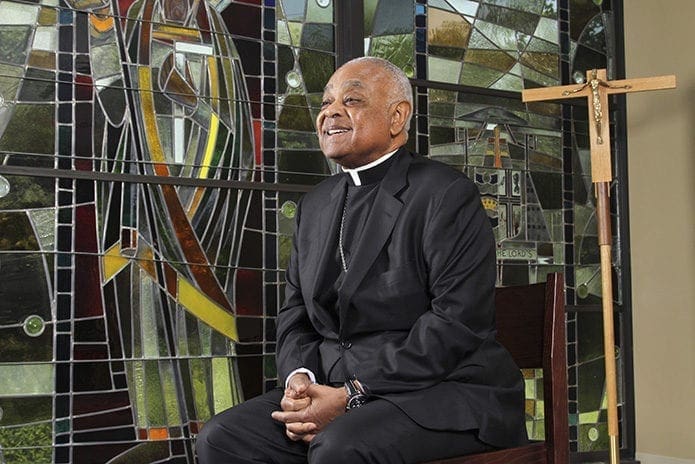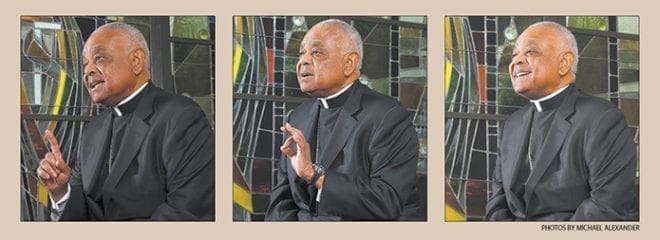 Photo By Michael Alexander
Photo By Michael AlexanderSmyrna
Archbishop Gregory shares memories, asks for prayers
By NICHOLE GOLDEN, Staff Writer | Published April 18, 2019 | En Español
SMYRNA—Archbishop Wilton D. Gregory regularly celebrates the noon Mass at the St. Dominic Chapel at the Chancery of the Archdiocese of Atlanta for employees and visitors. The chapel, which bears the name of the archbishop’s confirmation saint, proved a quiet place for him to take questions about his appointment to Washington and move from Atlanta.
In the April 11 interview with The Georgia Bulletin, he described a call from Archbishop Christophe Pierre, papal nuncio, with news of his appointment to lead the Archdiocese of Washington.
“I received a phone call on Monday, March 25, the Feast of the Annunciation,” said Archbishop Gregory. “He started out by saying, ‘there are new bishops today.’”
Archbishop Gregory believed the nuncio was referring to the ordinations of two new auxiliaries for the Archdiocese of the Military Services, who were being ordained that day.
“And he said, ‘no there’s another new bishop. There’s a new bishop of Washington, and it’s you.’”
After a few more exchanges, Archbishop Gregory said he told Archbishop Pierre, “Well if that’s what the Holy Father wants, that’s what I’ll do.”
Pope Francis was informed of the archbishop’s acceptance.
Archbishop Gregory had already committed to attend the April 2 installation Mass of Bishop David P. Talley, former Atlanta auxiliary bishop, as the new bishop of the Diocese of Memphis, Tennessee.
“That’s how April 4 was determined,” said Archbishop Gregory of the official announcement date.
He called it a “fitting date,” as it also marked the anniversary of the assassination of Dr. Martin Luther King Jr. The archbishop said in press conferences that he feels blessed to have served for so many years in the birthplace of the civil rights leader.
Memories and accomplishments
Archbishop Gregory shared his view of the local church, which he has led since January 2005.
“It seems to me that we here in Atlanta are in a privileged position. We are experiencing growth, and expansion while many other dioceses are experiencing contraction and realignment of existing structures,” he said. “And we’re building churches and expanding facilities so we are enjoying right now certainly a great blessing as the Lord adds to our numbers,” he said referring to the Acts of the Apostles’ description of the growth of believers.
In an Atlanta press conference earlier in the week, the archbishop fielded questions about what his legacy is. He indicated that he doesn’t think in terms of a legacy, although the community has experienced tremendous growth.
“Actually I think the thing that I take greatest satisfaction is that I have come to know this diocese well,” said Archbishop Gregory. “And I think that’s an important accomplishment for any pastor to be able to say that after a certain number of years, ‘I know and I love my people.’”
It’s clear that Atlanta’s Catholics consider their archbishop approachable.
Archbishop Gregory shared that as he travels around the archdiocese, people will come up to him often and ask, “Don’t you remember me?”
“Well, I may remember the face, I may even remember the occasion, but my comeback has always been, ‘well you gotta’ remember there’s one million, 200 thousand of you and one of me,’” he said laughing.
The Georgia Bulletin asked readers for memories of Archbishop Gregory and received numerous confirmation photos in response, speaking to the impact of the sacrament in the lives of Catholic families.

“I have always believed that with our young people the moment of confirmation is vitally important, obviously from a sacramental point of view; it’s the outpouring of the Holy Spirit, it’s a step toward their Christian maturity, their development as young people, but I’ve also always believed that it’s probably the first time that many of them have had a one-on-one with their bishop. And it should be a positive experience,” said Archbishop Gregory.
His own time in Atlanta brings fond memories including the annual June gathering of the Eucharistic Congress, started by the late Archbishop John F. Donoghue.
“I have grown to love the Eucharistic Congress,” he said. “It is a great moment and celebration of the vibrancy and the diversity of this local church.”
His favorite moment of the congress is after the initial procession when he takes the Blessed Sacrament to the chapel and then listens as the rest of the procession makes its way to the assembly hall.
“And I always thought that I was listening to the voice of God in many different languages and cultures of the folks who were processing into the assembly hall where the Blessed Sacrament would eventually be brought in. It often sent chills up my spine to hear, not to see, but to hear the voice of this church in prayer,” he said. “That’s the church in all of its ethnic and cultural attire and its music and its instruments. I always knew when the Vietnamese community came because they have the largest drum in Christendom.”
Of the 1.2 million Catholics in Atlanta, approximately half are Hispanics. The archbishop said we’ve done a good job in welcoming immigrant communities whether Latino, Vietnamese, or African, but certainly can do more. The communities bring with them a “heritage of faith, a deep religious identity,” he said.
“And that energizes this local church. Now, sometimes it creates, you know, a challenge because you’ve got to make sure that everybody’s in the family, and everybody feels comfortable and loved and respected. But when they bring their gifts, the church blossoms.”
He noted that many parishes do a spectacular job of welcoming all.
“Some of our parishes find occasions and opportunities to bring their diverse communities together in a festival or a religious play. They welcome the diversity and that too is a great gift. We can all learn from one another and learn how to respect and love one another,” said Archbishop Gregory.
In Washington, D.C., the archbishop will reside in an apartment above one of the largest Hispanic parishes of the district.
“And the archbishops have lived there for any number of years,” he said about the apartment. “I’m living over the church.”
Hopes and prayers
When asked his hopes for Atlanta’s Catholic community, Archbishop Gregory said, “My hopes would be that you get a good, loving archbishop who from day one realizes that he’s among the most fortunate of all people.”
When he was an auxiliary bishop in Chicago, Archbishop Gregory had the responsibility of installing and introducing new pastors to the parishes in his territory. He would always mention the “one glaring fault” of any new pastor—that he was not the former pastor, a way of reminding parishioners what is involved with change of leadership.
“He’s going to come in and he’s not going to do things exactly as they were. He has to come to know you and respect you and understand you. But you can’t expect him to be exactly like the pastor he has replaced,” reflected Archbishop Gregory. “None of us are clones. That’s the beauty of it.”
The archbishop leaves behind the 2015 Pastoral Plan as a living document.
“We wrote it to kind of guide us for the next six to seven years,” he said. “So it’s a platform that the new archbishop can use, but that he can change. He can do another survey or another means of gathering the input of people and saying ‘now, you’ve followed this for six or seven years, where should we go now?’”
He also said that everyone—the laity and clergy—has roles in helping the church address the crisis and to support priests.
“We all could do better, including myself. We all could do better about being close to our priests, trying to understand them, support them, encourage them, guide them,” he said.
The archbishop said lately he’s been using a quote attributed to Cardinal John Newman, who is set to be canonized soon.
When asked about the topic of laypeople in the church, Cardinal Newman said in response, “It would look foolish without them.”
“The clergy are obviously an important component of the church, but we’re a small component of the church. We’re important in the sacramental and ritual life of the church, but we’re only one part of the church, and the laypeople are the overwhelming majority of the church,” said Archbishop Gregory.
How did his 14-plus years in Atlanta prepare him to serve Catholics in the nation’s capital?
“It’s prepared me in the sense that I’ve discovered if you open yourself up to new ventures, to new experiences, to new people, God uses that as a blessing. It helps to develop you,” he said. “You don’t go into a place saying ‘I have the answers.’ You go into a place saying, ‘I’m standing on holy ground.’”
Archbishop Gregory asked for specific prayers from the faithful in Atlanta as he leaves.
“I ask you to pray that I get a generous and constant outpouring of the Holy Spirit that would provide me with the wisdom, the courage, the love and the patience to love the people to whom I am being sent as much as I have come to love the people that I am leaving behind,” he said.